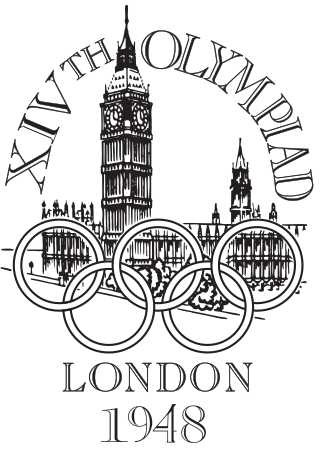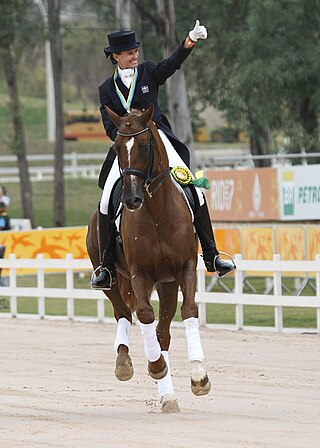
The 1948 Summer Olympics, officially the Games of the XIV Olympiad and officially branded as London 1948, were an international multi-sport event held from 29 July to 14 August 1948 in London, United Kingdom. Following a twelve-year hiatus caused by the outbreak of World War II, these were the first Summer Olympics held since the 1936 Games in Berlin. The 1940 Olympic Games had been scheduled for Tokyo and then for Helsinki, while the 1944 Olympic Games had been provisionally planned for London. This was the second time London hosted the Olympic Games, having previously hosted them in 1908, making it the second city to host summer olympics twice. The Olympics would return again to London 64 years later in 2012, making London the first city to host the games thrice, and the only such city until Paris, who hosted their third games in 2024, and Los Angeles, who will host theirs in 2028. The 1948 Olympic Games were also the first of two summer Games held under the IOC presidency of Sigfrid Edström.

A horse show is a judged exhibition of horses and ponies. Many different horse breeds and equestrian disciplines hold competitions worldwide, from local to the international levels. Most horse shows run from one to three days, sometimes longer for major, all-breed events or national and international championships. Most shows consist of a series of different performances, called classes, wherein a group of horses with similar training or characteristics compete against one another for awards and, often, prize money.
David John O'Connor is a retired equestrian who represented the United States in the sport of three-day eventing. He competed in two Olympic Games, winning a team silver at the 1996 Summer Olympics and an individual gold and team bronze at the 2000 Summer Olympics. At the 1999 Pan American Games, O'Connor took an individual silver and team gold and at the 2002 World Equestrian Games he assisted the US team to gold. After his retirement from competition in 2004, he became involved in the administrative side of international eventing. O'Connor has held top coaching roles for the US and Canadian national eventing teams, and was president of the United States Equestrian Federation from 2004 to 2012. During his career, O'Connor and his horses were awarded many honors, including equestrian and horse of the year awards from several organizations. In 2009, he was inducted to the United States Eventing Association's Hall of Fame, and two of his horses have been granted the same honor. O'Connor is married to fellow international event rider Karen O'Connor, and the pair operate two equestrian training facilities in the eastern United States.

Malin Birgitta Baryard-Johnsson is a Swedish equestrian, competing in show jumping. Baryard started to ride at the age of six and went on to be a very accomplished show jumper. She won a gold medal in the Swedish Championships at the age of just 14. She married Swedish TV presenter Henrik Johnsson in the summer of 2004, and made her TV-presenting debut in the autumn of 2004 on the SVT show Barbacka.

Equestrian sports were first included in the Olympic Games in the Summer Olympics of 1900 in Paris. They were again included in 1912, and have been included in every subsequent edition of the Games. Currently, the Olympic equestrian disciplines are dressage, eventing, and show jumping. In each discipline, both individual and team medals are awarded. Since the XV Olympiad in Helsinki in 1952, women and men compete on equal terms.

Yvonne Losos de Muñiz is an Olympic athlete and international Grand Prix dressage rider. Born in Nigeria to Canadian parents, she represents the Dominican Republic internationally. She belongs to the elite Dominican Olympic athlete program CRESO.
Nicole Uphoff is a German equestrian who competes in the sport of dressage. She won four gold medals in individual and team competition at the 1988 and 1992 Summer Olympics. Riding her star horse, Rembrandt, Uphoff also won numerous other international competitions, including the World Equestrian Games and the European Dressage Championships.

Gehnäll Persson was a Swedish Army fanjunkare and equestrian.
Equestrian events at the 2008 Summer Paralympics consisted of eleven dressage events. The competitions were held in the Hong Kong Olympic Equestrian Centre from 7 September to 11 September.

Laura Tomlinson MBE is a German-British dressage rider competing at Olympic level. As of 30 June 2012 the Fédération Équestre Internationale (FEI) ranked her 3rd in the world riding Mistral Højris and 36th on Andretti H. In that year, Tomlinson, riding Mistral Højris under her maiden name of Laura Bechtolsheimer, won two medals in the 2012 Summer Olympics in London; gold for Great Britain in the team dressage with Carl Hester and Charlotte Dujardin, the first ever Olympic team gold in the discipline for her country, and bronze in the individual dressage behind gold medalist and compatriot Dujardin.
Rembrandt was a dark bay Westphalian gelding ridden for Germany by Nicole Uphoff in dressage competitions. Together, the pair won four Olympic gold medals, three gold and one silver World Equestrian Games medals, and numerous other international championships. Although known as a sensitive horse prone to spookiness, Rembrandt's elegance and expression in the ring allowed him to become one of the top horses in the sport of dressage.

Sweden competed at the 2012 Summer Olympics in London, from 25 July to 12 August 2012. Swedish athletes have competed at every edition of the Summer Olympic Games in the modern era, except for the 1904 Summer Olympics in St. Louis. The Swedish Olympic Committee sent a total of 134 athletes to the Games, 55 men and 79 women, to compete in 20 sports. For the second consecutive time in its Olympic history, Sweden was represented by more female than male athletes.

Carl Hester is a British dressage rider competing at Olympic level. As of 8 August 2012, the Fédération Équestre Internationale (FEI) rank him 12th in the world riding Uthopia. In 2012, Hester formed part of the Great Britain Dressage team that won gold at the 2012 Summer Olympics.

Para-equestrian is an equestrian sport governed by the International Federation for Equestrian Sports (FEI), and includes two competitive events. One is para-equestrian dressage, which is conducted under the same basic rules as conventional dressage, but with riders divided into different competition grades based on their functional abilities. The other is para-equestrian driving, which operates under the same basic rules as combined driving but places competitors in various grades based on their functional abilities.
The individual dressage in equestrian at the 1948 Olympic Games in London was held in Aldershot from 9 to 10 August. Swiss rider Hans Moser won the gold medal. The silver was won by André Jousseaume of France and the bronze by Swedish rider Gustaf Adolf Boltenstern, Jr. The sixth place finisher, Gehnäll Persson, was disqualified when it was discovered that he was only a noncommissioned officer and thus ineligible to compete.
The individual eventing in equestrian at the 1948 Olympic Games in London was held in the town of Aldershot and at the Tweseldown Racecourse from 10 to 13 August. Bernard Chevallier of France won the gold medal. Frank Henry, from the United States, won silver and Robert Selfelt, from Sweden, took bronze. The team and individual eventing competitions used the same scores. Eventing consisted of a dressage test, a cross-country test, and a jumping test.
The team eventing in equestrian at the 1948 Olympic Games in London was held in the town of Aldershot and at the Tweseldown Racecourse from 10 to 13 August. The American team of Charles Anderson, Frank Henry and Earl Foster Thomson won the gold medal. Sweden won the silver medal and Mexico took bronze.

The Equestrian Federation of India is the governing body for equestrian sports in India.
Equestrian competitions at the 2019 Pan American Games in Lima, Peru were held from July 27 to August 10. The venue for the competition is the Equestrian Club Militar La Molina. A total of 150 athletes are scheduled to compete in the three disciplines of dressage, eventing and jumping, each with an individual and team event.












